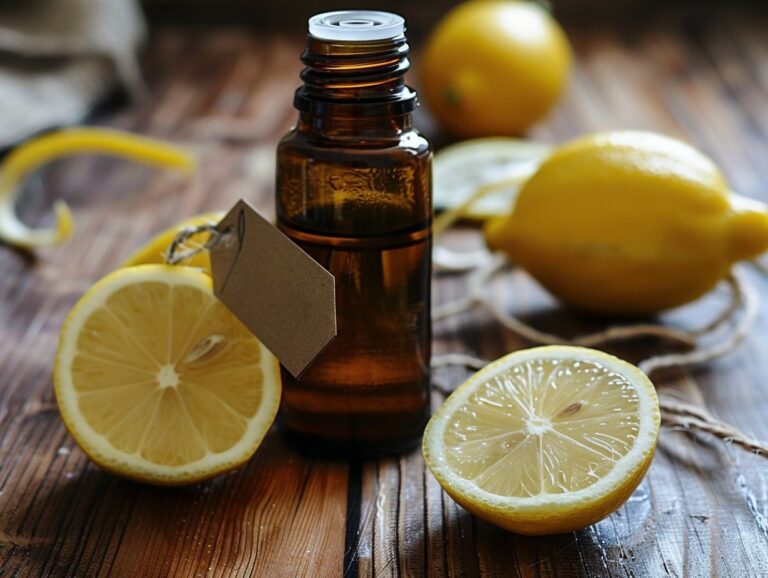Can Essential Oils Get Rid of Skunk Smell
Have you ever been unfortunate enough to encounter the unmistakable scent of a skunk? The effects of skunk smell can be not only irritating but also embarrassing, not to mention the potential health risks.
We explore how skunk smell gets on you, its effects, and most importantly, how to get rid of it. We will specifically delve into the use of essential oils for eliminating skunk odor, discussing the best oils to use, how to apply them, and the safety considerations for both humans and pets.
If you’re looking for a natural solution to this stinky problem, keep reading to learn more.
Key Takeaways:
What Is Skunk Smell?
Skunk smell is a pungent, offensive odor produced by skunks as a defense mechanism against potential threats. The smell can be described as a combination of sulfur-like compounds that are highly potent and can linger for days.
When a skunk feels threatened or endangered, its scent glands release a mixture of chemicals containing thiol compounds, responsible for the powerful stench. These thiol compounds, such as butyl mercaptan and dimethyl disulfide, create the distinctive skunk odor that is instantly recognizable. This strong smell acts as a deterrent to predators, warning them to stay away. Unfortunately, the same defense mechanism that protects skunks can have an unpleasant impact on humans and animals, causing irritation and discomfort.
How Does Skunk Smell Get On You?
Skunk smell can get on humans and animals through direct contact with a skunk’s spray or by being in close proximity to a skunk when it releases its defensive odor. The scent molecules attach to skin, hair, or clothing, making it challenging to remove.
One of the main challenges in removing skunk smell is that the odor molecules are highly persistent, and they can linger for days even after initial exposure. The strong, pungent smell can seep into fabrics, making it tricky to completely eliminate the stench. Pets, in particular, can bring in the smell from outside and spread it indoors, amplifying the difficulty of eradicating it entirely from a living space.
What Are The Effects Of Skunk Smell?
Skunk smell can have several effects, including causing irritation to the eyes, nose, and throat, leading to discomfort and potential health risks. The strong and lasting odor can result in embarrassment in social situations.
The pungent scent of a skunk can linger for days, clinging to clothes, furniture, and even pets, affecting not only the individual but also the immediate surroundings. The potent smell is not only unpleasant but can also trigger headaches and nausea in sensitive individuals. In some cases, prolonged exposure to skunk odor may exacerbate existing respiratory conditions or allergies, posing a significant health concern.
Irritation
The irritation caused by skunk smell is primarily due to the offensive odor compounds that can trigger discomfort in the eyes, nose, and throat. The strong scent can lead to headaches and nausea in some individuals.
When one comes into contact with this pungent aroma, it not only assaults the olfactory senses, but can also linger on clothes and skin, intensifying the annoyance.
Skunk spray contains sulfur-based chemicals that not only permeate the air but can also cause a burning sensation in the nasal passages and eyes, exacerbating the discomfort. The smell can be overwhelming, triggering gag reflexes in some, making it challenging to breathe without feeling a sense of revulsion.
Embarrassment
The embarrassment from skunk smell arises from the strong and enduring nature of the odor, which can persist on clothing and skin, leading to awkward and uncomfortable encounters in social settings.
While one can easily wash off most scents, skunk smell tends to cling stubbornly, making it challenging to get rid of completely. This lingering aroma not only affects personal hygiene but also impacts social interactions profoundly. Imagine being at a business meeting or a dinner party, only to have others wrinkling their noses or making comments about the offensive smell. Such moments can be incredibly embarrassing, leaving a lasting impression on both oneself and those around. The stigma associated with skunk odor can lead to isolation and avoidance in social circles, amplifying the distress caused by this distinctive smell.
Health Risks

Skunk spray contains various volatile chemicals that can affect individuals differently. For some, the strong odor alone can trigger nausea and discomfort, while others may experience more severe symptoms like chest tightness and difficulty breathing. These reactions are especially concerning for individuals with asthma or other respiratory issues, as the compounds in skunk spray can further inflame the airways.
It is crucial to seek immediate medical attention if exposure to skunk smell results in persistent symptoms or severe respiratory distress.
How To Get Rid Of Skunk Smell?
Removing skunk smell can be achieved through various methods, including traditional remedies like hydrogen peroxide and baking soda, as well as natural solutions such as essential oils and liquid dishwashing soap.
Traditional methods like using a mixture of hydrogen peroxide, baking soda, and liquid dish soap have been a classic go-to for many dealing with skunk odor. This concoction works by chemically altering the compounds that cause the smell, effectively neutralizing it.
On the other hand, natural remedies like essential oils for smoke smell, such as lavender or peppermint, can help mask and replace the skunk odor with a more pleasant scent. Incorporating vinegar into your cleaning routine can help eliminate the lingering smell by breaking down the skunk spray molecules.
While each method has its benefits, choosing the right approach depends on personal preferences and the severity of the odor.
Traditional Methods
Traditional methods for getting rid of skunk smell often involve a mixture of hydrogen peroxide, baking soda, and liquid dishwashing soap. These ingredients work together to break down the odor-causing compounds.
Hydrogen peroxide serves as an effective oxidizing agent that helps neutralize the volatile thiols released by skunks, thereby minimizing the pungent smell. Mixing it with baking soda and dishwashing soap creates a powerful solution that tackles odor molecules. The baking soda acts as a deodorizer, absorbing odors from the surrounding materials, while the dishwashing soap helps in breaking down oily residue left behind. When combined in the right proportions, this potent mixture can significantly reduce the skunk odor from various surfaces.
Natural Remedies
Natural remedies for removing skunk smell include the use of essential oils like lavender oil, lemon oil, and tea tree oil, known for their deodorizing and antimicrobial properties. These oils can be mixed with a carrier oil for safe application.
One of the key advantages of using essential oils is that they not only mask the skunk odor but also help neutralize it due to their natural chemical compounds. For instance, lavender oil has calming and disinfectant properties, lemon oil has a refreshing scent that can overpower the skunk smell, and tea tree oil is renowned for its antibacterial and antifungal qualities.
What Are Essential Oils?
Essential oils are concentrated plant extracts known for their natural fragrance and therapeutic properties. These oils are derived from various plant parts and have been used for aromatherapy, skincare, and home care.
They have been incorporated into various cultures for centuries due to their diverse benefits, ranging from relaxation and stress relief to promoting skin health and even aiding in household cleaning. The extraction process involves distilling or cold pressing plant materials like flowers, leaves, roots, and peels to capture their potent essence. What sets essential oils apart is their concentrated nature, requiring only a few drops to unleash their powerful effects.
Can Essential Oils Get Rid Of Skunk Smell?
Essential oils have been found to be effective in neutralizing skunk smell due to their deodorizing and antimicrobial properties. Oils like lavender, lemon, and tea tree are particularly useful in combating strong odors.
When a skunk’s offensive odor permeates the air, turning to essential oils can offer a natural and efficient solution. These oils work by not just masking the smell, but by actively breaking down the odorous compounds and eliminating them altogether. Lavender, with its calming aroma, lemon with its fresh citrus notes, and tea tree known for its powerful cleansing properties, are like natural air purifiers that can help transform the noxious skunk odor into a more pleasant scent. Their antimicrobial actions also assist in removing bacteria that may accompany the smell, ensuring a thorough deodorizing effect that lasts.
What Are The Best Essential Oils To Use?

The best essential oils for tackling skunk smell include lavender oil, lemon oil, tea tree oil, peppermint oil, and eucalyptus oil. These oils are known for their potent fragrance and antimicrobial properties.
Lavender oil is particularly effective in neutralizing the foul odor of skunk spray while promoting relaxation and stress relief.
Lemon oil acts as a powerful deodorizer, cutting through the skunky scent with its refreshing citrus notes.
Tea tree oil not only helps mask the skunk smell but also boasts strong antibacterial properties, making it a great choice for eliminating odor-causing bacteria.
Additionally, peppermint oil offers a cooling sensation and a pleasant minty aroma, which can quickly overpower the skunk odor.
Eucalyptus oil brings its camphoraceous scent, renowned for its decongestant properties, which can aid in clearing the air of skunk stench.
How To Use Essential Oils To Get Rid Of Skunk Smell?
Essential oils can be used to get rid of skunk smell through methods like direct application, dilution with a carrier oil, or misting using a spray bottle. Each approach offers effective ways to neutralize the odor.
Direct application involves applying undiluted essential oils directly to the affected areas, like clothing or skin, to combat the potent skunk smell. On the other hand, dilution with a carrier oil, such as coconut or almond oil, helps distribute the essential oil evenly while minimizing skin irritation. Misting is a convenient method that involves adding a few drops of essential oil to water in a spray bottle and spritzing the blend in the affected space to freshen the air.
Direct Application
Direct application of essential oils involves applying a few drops of the selected oil directly onto the affected area to combat the skunk smell at the source.
This method targets specific areas for concentrated treatment.
By pinpointing the affected spot, this technique allows the potent properties of the essential oil to work directly where they are needed most, penetrating deep to neutralize the skunk odor molecules effectively.
Unlike masking agents that simply cover up the smell temporarily, essential oils actively work to break down and eliminate the source of the odor, providing a more lasting and complete solution.
Dilution
Dilution of essential oils involves mixing them with a carrier oil like coconut, almond, or jojoba oil to create a safe and effective solution for combating skunk smell. This method ensures proper diffusion and reduces the risk of skin irritation.
When dealing with strong odors like skunk spray, diluting essential oils is essential as undiluted oils can be too potent and may cause adverse reactions.
-
Proper dilution ratios are crucial to strike the right balance between effectiveness and safety.
-
Selecting the right carrier oil is key – coconut oil is soothing, almond oil is nourishing, and jojoba oil mimics the skin’s natural oils, enhancing absorption.
Misting
Misting essential oils involves using a spray bottle or diffuser to disperse the oil particles into the air, effectively neutralizing skunk smell in the surrounding environment. This method offers a convenient way to freshen up indoor spaces.
When using this technique, it’s crucial to select essential oils with strong deodorizing properties such as tea tree, lavender, or citrus oils to effectively combat the potent skunk odor. The process is simple; fill a spray bottle or diffuser with water and add a few drops of the chosen essential oil. Shake the bottle well to ensure proper mixing before gently misting the solution in the affected area.
Are Essential Oils Safe To Use?
Essential oils are generally safe to use for humans and pets when used correctly and in appropriate dilutions. Certain oils may be toxic to animals, so it is essential to research and follow proper guidelines.
One important consideration when using essential oils is to always store them out of reach of pets and children to avoid accidental ingestion, which could lead to serious health issues. It is also crucial to note that cats are particularly sensitive to essential oils, especially those high in phenols such as tea tree or oregano. Before using any essential oil on your pet, consult with a veterinarian to ensure it is safe for their specific species and health condition.
For Humans

Essential oils can be safe and effective for humans when used appropriately, providing natural solutions for various concerns. It is essential to conduct a patch test and adhere to recommended dilution ratios.
When using essential oils, it is crucial to consider the method of application. A common way to enjoy the benefits of essential oils is through aromatherapy, where oils are diffused into the air.
Topical application, such as massages, is another popular method but needs to be done with caution. Knowing the specific benefits and potential risks associated with each oil is important in ensuring a positive experience.
Remember, moderation is key, and always follow reputable guidelines to ensure the safe use of essential oils.
For Pets
When using essential oils for pets, it is crucial to ensure the oils are safe for animal use and are diluted appropriately with a carrier oil to prevent adverse reactions. Certain oils should be avoided for specific animals.
For dogs, extra caution should be taken with oils containing phenols like thyme or oregano as they can be toxic if ingested or absorbed through the skin. Cats, due to their unique metabolism, are especially sensitive to oils high in monoterpenes like citrus oils, which can lead to adverse effects on their liver.
It’s essential to consult with a veterinarian or a professional aromatherapist knowledgeable about animal aromatherapy before using essential oils on pets to ensure you are using them safely and effectively. Each animal species reacts differently to oils, so understanding the appropriate dilution ratios is crucial for their well-being.
Frequently Asked Questions
Can essential oils really get rid of skunk smell?
Yes, certain essential oils have properties that can effectively neutralize skunk odor and eliminate it from your home, clothing, or pets.
Which essential oils work best for getting rid of skunk smell?
Lavender, peppermint, eucalyptus, and lemon essential oils are known for their strong odor-fighting abilities and are commonly recommended for removing skunk smell.
How should I use essential oils to get rid of skunk smell?
You can either diffuse the essential oils in the affected area or create a spray by mixing a few drops of the oil with water and spraying it onto surfaces or fabrics. For pets, you can add a few drops of the oil to their bath water.
Are there any precautions I should take when using essential oils for skunk smell?
Yes, always dilute the essential oils properly before use and do a patch test on fabrics or surfaces to ensure they do not get damaged. Also, avoid using essential oils on or around pets with sensitive skin or respiratory issues.
Can essential oils completely remove skunk smell or just mask it?
Essential oils can effectively neutralize and eliminate skunk odor, rather than just masking it. Their strong aromatic properties can break down the smelly compounds and eliminate them.
Are there any other natural remedies that can help get rid of skunk smell?
Yes, besides essential oils, vinegar, baking soda, and activated charcoal are also effective natural remedies for removing skunk odor.








2 Comments